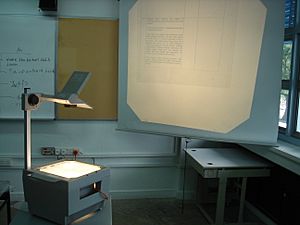Transparency (projection) facts for kids
A transparency is a thin, clear sheet of plastic, usually made from polyester. People used to draw or print pictures and words onto these sheets. Then, they would place the transparency on a special machine called an overhead projector. This projector would shine a bright light through the transparency, making a much larger image appear on a screen or wall for everyone to see.
For many years, companies, schools, and other groups used transparencies and overhead projectors for meetings and presentations. However, today, most people use modern video projectors and interactive whiteboards instead.
Contents
How Transparencies Were Made
Transparencies could be created in different ways over time.
Printing on Transparencies
In the past, special machines like laser printers or copiers could print directly onto transparency sheets. These sheets were designed to handle the heat from the printers.
There were also special transparencies for inkjet printers. These had a coating that could soak up the liquid ink. You had to be careful with them, though, because too much moisture could make them cloudy. Also, they usually only had the coating on one side, so you had to load them into the printer correctly.
What Were Transparencies Used For?
Transparencies were used in many different places and for many different reasons.
In Schools
Teachers often used transparencies in subjects like mathematics, history, and geography. They helped to show examples, solve problems, or display maps and timelines. For math classes, long problems or special symbols that weren't on regular computer keyboards could be drawn on rolls of clear plastic.
In Businesses
Big companies, especially those that built airplanes like Boeing, used transparencies in their meetings. They would show engineers and other staff new designs for aircraft or changes to existing ones. They also used them to highlight problems that needed to be fixed.
In Religious Groups
Some churches and other religious groups used transparencies during their services. They would display outlines of sermons or show pictures related to topics like ancient battles or historical artifacts from the Old Testament. They also used them for business meetings to share information.
See also
- Presentation slide
- Projection panel
 | Leon Lynch |
 | Milton P. Webster |
 | Ferdinand Smith |


